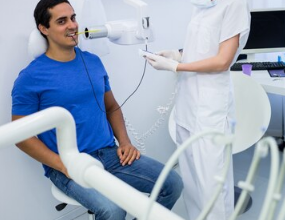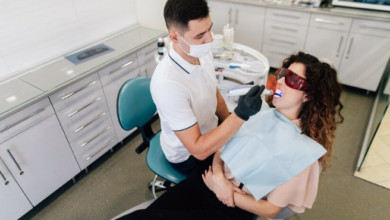Transform Your Smile with Full Arch Implant in Athol: A Comprehensive Guide

If you’re considering a full arch implant in Athol, you’re not alone. Many people are looking for ways to restore their smiles and improve their quality of life. Full arch implants can provide a permanent solution for those with missing teeth, offering both functional and aesthetic benefits. This guide will walk you through everything you need to know about the procedure, costs, and maintenance, so you can make an informed decision about your dental health.
Key Takeaways
- Full arch implants replace an entire row of teeth with a secure, permanent solution.
- The procedure involves initial consultations, surgery, and a recovery period.
- Costs can vary based on several factors, but financing options are often available.
- Proper care and regular check-ups are essential for maintaining your implants.
- Patient testimonials highlight significant improvements in confidence and quality of life.
Understanding Full Arch Implants
What Are Full Arch Implants?
Okay, so you’re missing a bunch of teeth, or maybe all of them, on either your top or bottom jaw. Full arch implants are basically a way to get a whole new set of teeth full teeth replacement method all at once. Instead of getting an implant for every single tooth, which would be super expensive and a lot of work, you get a few implants – usually four to six – that support a full arch of artificial teeth. Think of it like building a bridge; you only need a few strong supports to hold the whole thing up. These implants are titanium posts that fuse with your jawbone, providing a solid base for your new teeth.
Benefits of Full Arch Implants
Why would someone choose full arch implants over, say, dentures? Well, there are a bunch of good reasons:
- Stability: Implants are anchored in your jawbone, so they don’t slip or slide around like dentures sometimes do. You can eat whatever you want without worrying about your teeth moving.
- Bone Health: When you lose teeth, your jawbone starts to shrink. Implants help stimulate bone growth, which keeps your jawbone strong and healthy.
- Appearance: Full arch implants look and feel like natural teeth. They can really improve your smile and boost your confidence.
- Long-Term Solution: With proper care, implants can last for many years, even a lifetime. Dentures, on the other hand, usually need to be replaced every few years.
I remember my grandpa always complaining about his dentures. He couldn’t eat corn on the cob, and they always felt loose. Full arch implants solve those problems. They’re a more permanent and comfortable solution.
Who Is a Candidate for Full Arch Implants?
Not everyone is a good fit for full arch implants. Here are some things that dentists look for:
- Good Overall Health: You need to be healthy enough to undergo surgery. Certain medical conditions, like uncontrolled diabetes, can affect healing.
- Sufficient Bone Density: The implants need enough bone to fuse to. If you’ve lost a lot of bone, you might need a bone graft first.
- Good Oral Hygiene: You need to be committed to taking care of your implants. That means brushing, flossing, and regular dental checkups. If you don’t take care of them, they can get infected and fail.
Here’s a quick table to summarize:
| Factor | Ideal Candidate | Potential Issues |
| Overall Health | Good general health, no uncontrolled conditions | Uncontrolled diabetes, autoimmune diseases |
| Bone Density | Sufficient bone volume in the jaw | Significant bone loss, requiring bone grafting |
| Oral Hygiene | Excellent oral hygiene habits | Poor oral hygiene, increased risk of infection |
| Commitment to Care | Willing to maintain regular dental visits | Neglecting oral hygiene, infrequent dental visits |
The Full Arch Implant Procedure
Initial Consultation and Planning
Okay, so you’re thinking about full arch implants? The first step is always a consultation. This isn’t just a quick chat; it’s where the dentist really gets to know your mouth. They’ll do a thorough exam, probably take some X-rays or even a CT scan. This helps them see everything going on beneath the surface, like bone density and nerve placement. They’ll also talk to you about your medical history and what you’re hoping to achieve with the implants. All this information is used to create a personalized treatment plan.
- Discuss your goals and expectations.
- Evaluate your overall health.
- Take detailed images of your mouth and jaw.
The initial consultation is super important. It’s where the dentist figures out if you’re a good candidate for full arch implants and starts planning the whole process. Don’t be afraid to ask questions!
Surgical Procedure Overview
Alright, surgery day! Don’t worry, you’ll likely be sedated to keep you comfortable. The dentist will start by placing the implants into your jawbone. The number of implants can vary, but it’s usually between four and six per arch. These implants act like the new roots for your teeth. Sometimes, if your jawbone isn’t strong enough, you might need a bone graft first. This involves adding bone material to the area to create a solid foundation for the implants. After the implants are placed, they’ll need time to heal and fuse with your jawbone – this is called osseointegration. This process can take several months. After osseointegration, abutments are attached to the implants. These abutments will connect to the final set of teeth. Finally, a custom-made crown is created to match your natural teeth.
Post-Operative Care and Recovery
So, you’ve got your implants – now what? Post-op care is key to making sure everything heals properly. You’ll probably have some swelling and discomfort for the first few days, but your dentist will give you pain medication to manage it. You’ll also need to stick to a soft food diet for a while to avoid putting too much pressure on the implants. It’s super important to keep your mouth clean to prevent infection. Your dentist in Athol will give you specific instructions on how to brush and rinse. Regular check-ups are also a must to monitor the healing process and make sure everything is going smoothly. Following these instructions carefully will help ensure the long-term success of your full arch implants.
Here’s a quick guide to post-op care:
- Take prescribed medications as directed.
- Maintain excellent oral hygiene.
- Attend all follow-up appointments.
Cost Considerations for Full Arch Implants
Factors Influencing Cost
Okay, let’s talk money. Figuring out the cost of full mouth restoration can feel like trying to solve a puzzle, but it doesn’t have to be that bad. Several things affect the final price tag. First, there’s the type of implant used. Some are fancier (and pricier) than others. Then, there’s the amount of work needed – if you need extractions or bone grafting, that’ll add to the cost. And, of course, the dentist’s experience and location play a role too. Dentists with more experience might charge more, and prices can vary depending on where you are in Athol. The complexity of your specific case is a major factor.
Here’s a quick rundown of potential cost factors:
- Type of implant material
- Number of implants required
- Need for additional procedures (extractions, bone grafts)
- Dentist’s experience and expertise
- Geographic location
Financing Options Available
So, full arch implants can be a bit of an investment, right? But don’t let that scare you off. There are ways to make it more manageable. Many dental offices offer financing plans that let you spread out the payments over time. Think of it like paying for a car – you make monthly payments instead of dropping a huge chunk of cash all at once. Some companies specialize in healthcare financing, and they might offer better rates or terms than your regular credit card. It’s always a good idea to shop around and see what’s out there. Plus, some dentists offer in-house payment plans, so it’s worth asking about that too.
Insurance Coverage for Implants
Now, insurance. This is where things can get a little tricky. Most dental insurance plans don’t cover the full cost of implants, but some might cover a portion. It really depends on your specific plan and what it includes. It’s worth calling your insurance company to see what they’ll pay for. They might cover the cost of the crown or bridge that goes on top of the implant, even if they don’t cover the implant itself. Also, check if your plan has an annual maximum – that’s the most they’ll pay out in a year. If you’re lucky, your medical insurance might kick in if the tooth loss is due to a medical condition. Always good to check all avenues.
Understanding the financial aspect of full arch implants is important. Don’t hesitate to discuss all available options with your dentist and insurance provider to find a solution that fits your budget. Being informed empowers you to make the best decision for your oral health and overall well-being.
Maintaining Your Full Arch Implants
Daily Care and Hygiene Tips
Taking care of your full arch implants is super important for making sure they last. It’s not really that different from taking care of regular teeth, but there are a few things to keep in mind.
- Brush at least twice a day with a soft-bristled brush. Pay attention to the gumline around the implants.
- Use a low-abrasive toothpaste. Some toothpastes are too harsh and can scratch the implant material.
- Floss daily! This helps get rid of plaque and food particles that your toothbrush might miss. Special floss threaders or interdental brushes can be helpful for getting around the implants.
It’s a good idea to use a water flosser too. It can help flush out bacteria and debris from hard-to-reach areas. Just be sure to use it on a low setting at first, so you don’t irritate your gums.
Regular Dental Check-Ups
Even if you’re diligent about your home care, you still need to see your dentist regularly. These check-ups are key for catching any potential problems early. During these visits, your dentist will:
- Examine your implants to make sure they’re stable and healthy.
- Check your gums for any signs of inflammation or infection.
- Perform a professional cleaning to remove any plaque or tartar buildup.
Regular check-ups are non-negotiable. Think of it like taking your car in for routine maintenance – it helps prevent bigger problems down the road. The frequency of your visits will depend on your individual needs, but most people with implants should see their dentist every six months.
Signs of Potential Issues
It’s important to be aware of any signs that something might be wrong with your implants. Catching problems early can make a big difference in the long run. Here are some things to watch out for:
- Pain or discomfort around the implants
- Swelling or redness of the gums
- Bleeding when brushing or flossing
- Loose implants
- Difficulty chewing
If you notice any of these symptoms, don’t wait! Contact your dentist right away. Early intervention can often save your implants and prevent more serious problems. Ignoring these signs can lead to implant failure, which is something you definitely want to avoid. It’s better to be safe than sorry when it comes to your dental implant specialist.
Comparing Full Arch Implants to Other Options
Full Arch Implants vs. Dentures
Okay, so you’re missing a whole bunch of teeth, and you’re trying to figure out what to do. Let’s talk about full arch implants versus dentures. Dentures are the classic solution, right? They’re removable, and they’ve been around forever. But they can be a pain. They can slip, they can feel bulky, and sometimes food gets stuck under them. Implants, on the other hand, are fixed in place. Think of them as secure foundation for a new set of teeth. You brush them like normal teeth, and you don’t have to worry about them going anywhere. The big difference is stability and comfort.
Here’s a quick rundown:
- Dentures: Removable, less expensive upfront, can affect speech and taste.
- Full Arch Implants: Permanent, more expensive upfront, feel and function like natural teeth.
- Both: Restore your smile and improve chewing ability.
Choosing between dentures and implants really comes down to your budget, your lifestyle, and what you’re looking for in terms of comfort and convenience. If you want something that feels as close to natural teeth as possible and you’re willing to invest more, implants are the way to go. If you’re on a tighter budget and you don’t mind the drawbacks of removable dentures, they can be a good option.
Full Arch Implants vs. Bridges
Now, what about bridges? Bridges are another way to replace missing teeth, but they’re usually used for replacing just a few teeth, not a whole arch. A traditional bridge involves anchoring a false tooth to the teeth on either side of the gap. With full arch implants, you’re not relying on existing teeth for support. Each implant is a self-sufficient unit. Bridges can also put extra stress on the adjacent teeth, which can lead to problems down the road. Full arch implants avoid this issue altogether. They are a [full-tooth replacement method].
Here’s a simple comparison:
- Bridges: Suitable for replacing a few teeth, rely on adjacent teeth for support, can be less expensive than implants.
- Full Arch Implants: Suitable for replacing an entire arch of teeth, don’t rely on adjacent teeth, more durable and long-lasting.
- Both: Improve appearance and chewing function.
Long-Term Benefits of Implants
Okay, so implants cost more upfront. That’s a fact. But what about the long run? That’s where implants really shine. Dentures and bridges often need to be replaced or adjusted over time. Implants, if properly cared for, can last a lifetime. That means fewer trips to the dentist, less money spent on replacements, and a more stable, comfortable smile for years to come. Plus, implants help to preserve your jawbone. When you lose teeth, the bone in that area starts to deteriorate. Implants stimulate bone growth, which helps to keep your jaw strong and healthy. This is a huge advantage that you don’t get with dentures or bridges. They are made up of three different parts.
Here’s a list of long-term benefits:
- Longevity: Implants can last a lifetime with proper care.
- Bone Preservation: Implants stimulate bone growth and prevent bone loss.
- Improved Quality of Life: Implants feel and function like natural teeth, improving your ability to eat, speak, and smile with confidence.
Patient Experiences and Testimonials
Real-Life Success Stories
It’s one thing to talk about the potential of full arch implants, but it’s another to hear from people who’ve actually gone through the process. I’ve heard some amazing stories. One patient, a retired teacher named Carol, had struggled with dentures for years. She couldn’t eat her favorite foods and felt self-conscious about her smile. After getting full arch implants, she said it was like getting a new lease on life. She could finally enjoy meals with her family and felt confident smiling again. It’s stories like Carol’s that really highlight the impact these implants can have.
Before and After Transformations
Seeing is believing, right? It’s pretty wild to look at before and after photos. You see people who were hesitant to smile, maybe missing teeth, and then you see them beaming with a full, natural-looking set of teeth. The change isn’t just cosmetic; it’s like they’ve gained a whole new level of self-assurance. It’s not just about the teeth; it’s about how they feel about themselves. I think that’s a big part of why people choose to go this route. The transformations are really something else. I’ve seen some pretty dramatic changes, and it’s always inspiring.
Common Concerns Addressed
People have questions, and that’s totally normal. A big one is usually about pain. No one wants to go through a painful procedure. The good news is that with modern techniques and anesthesia, the discomfort is manageable. Another concern is the cost. It’s an investment, no doubt about it. But when you consider the long-term benefits and the improvement in quality of life, many people find it worthwhile. Then there’s the fear of the unknown. What’s the surgery like? What’s the recovery like? That’s why it’s so important to talk to your dentist, ask questions, and get all the information you need to feel comfortable. The staff at the dentist office are helpful and friendly, and provide thorough explanations and show genuine concern for their well-being friendly staff.
It’s important to remember that everyone’s experience is unique. What works for one person might not be the best choice for another. That’s why it’s so important to have a thorough consultation with a qualified dental professional to determine if full arch implants are the right solution for you.
Finding the Right Provider for Full Arch Implants in Athol
Choosing the right provider for full arch implants is a big deal. You want someone who knows their stuff and makes you feel comfortable. It’s not just about getting new teeth; it’s about improving your quality of life. So, how do you find the best dentist or oral surgeon in Athol for this procedure?
What to Look for in a Dental Implant Specialist
First off, experience matters. You want a specialist who has done a lot of these procedures. Look for someone who is board-certified and has specific training in implant dentistry. It’s also good to check their credentials and see if they are members of any professional organizations. A good specialist will also use advanced technology and techniques to ensure the best possible outcome.
Here’s a quick checklist:
- Board certification
- Extensive experience with full arch implants
- Use of advanced technology (like 3D imaging)
- Positive patient reviews
Questions to Ask During Your Consultation
Don’t be shy about asking questions during your consultation. This is your chance to get all the information you need to make an informed decision. Ask about their experience, the type of implants they use, and the success rate of their procedures. Also, ask about the potential risks and complications, and what happens if something goes wrong.
Here are some questions to consider:
- How many full arch implant procedures have you performed?
- What type of implants do you use, and why?
- What is your success rate with this procedure?
Understanding the Importance of Experience
Experience really does matter when it comes to full arch implants. An experienced provider is more likely to anticipate potential problems and handle them effectively. They also have a better understanding of the nuances of the procedure and can tailor it to your specific needs. Choosing someone with a proven track record can give you peace of mind and increase your chances of a successful outcome.
It’s important to remember that full arch implants are a significant investment in your oral health. Taking the time to find the right provider can make all the difference in the success of your treatment and your overall satisfaction. Don’t rush the process, do your research, and choose someone you trust.
Wrapping It Up: Your New Smile Awaits
So there you have it! Full arch implants can really change the game when it comes to your smile. If you’re tired of dealing with missing teeth or uncomfortable dentures, this might just be the solution you need. Remember, it’s not just about looks; it’s about feeling good and being able to eat what you want without worry. If you’re in Athol and thinking about taking the plunge, reach out to a local dental professional. They can help you figure out if full arch implants are right for you. Don’t wait too long—your new smile is just a call away!
Frequently Asked Questions
What exactly are full arch implants?
Full arch implants are a type of dental treatment that replaces all the teeth in your upper or lower jaw. They use a few strong implants to support a complete set of new teeth.
What are the advantages of full arch implants?
Full arch implants can improve your smile, make eating easier, and help you speak clearly. They also prevent bone loss in your jaw, which can happen when you lose teeth.
Am I a good candidate for full arch implants?
If you have lost most or all of your teeth and are in good health, you might be a good candidate for full arch implants. Your dentist will evaluate your mouth and jaw to determine this.
What happens during the full arch implant process?
The process starts with a consultation, followed by surgery to place the implants. After that, you will have a recovery period before getting your new teeth.
How much do full arch implants cost?
The cost of full arch implants can vary based on several factors, including the materials used and your specific dental needs. It’s best to discuss this with your dental provider.
How do I take care of my full arch implants?
To keep your implants in good shape, brush and floss your teeth daily, and visit your dentist for regular check-ups. If you notice any problems, contact your dentist right away.




